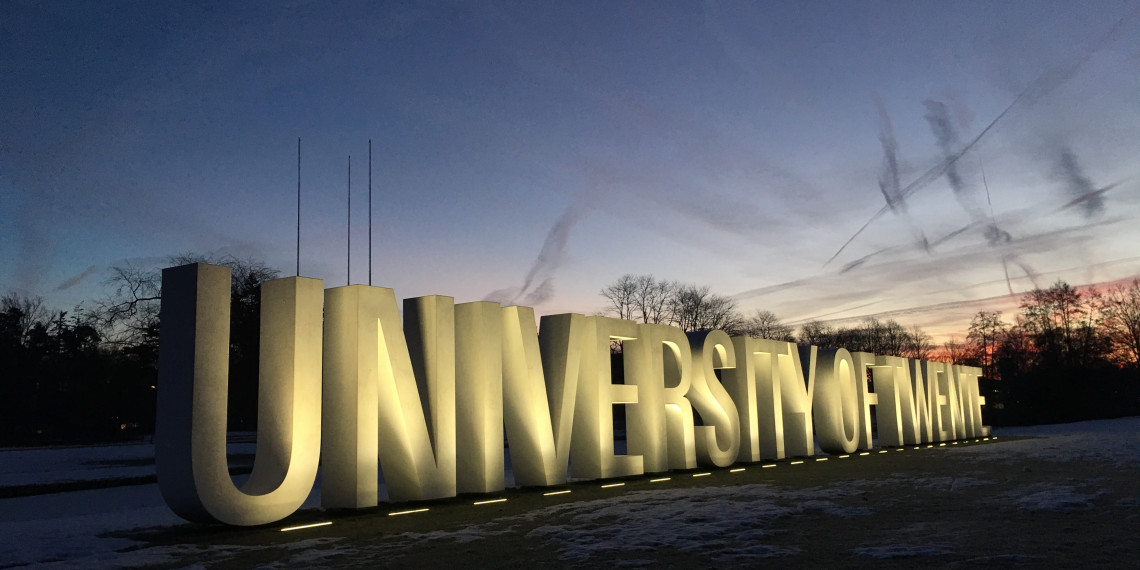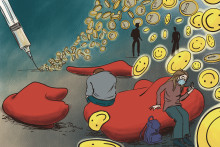'2023 will be a financially interesting year. I hope we don't lose control of the wheel.' These are the words of university council chairman Herbert Wormeester on 14 December 2022. On that day, the Executive Board discussed the 2023 annual budget with the university council. This with a calculated deficit of €13 million in 2022 in the back of their minds.
Pulling out wallets
On that particular 14 December, an 'ambitious' budget for 2023 was on the table, with an expected deficit of 15 million euros. Because the Executive Board wants to invest 'countercyclically'. In other words: in view of an economic downturn, it is pulling out the wallet to cushion a downward trend. That message does come in the face of uncertain financial times at the end of 2022, with sharply higher energy prices and disappointing enrolment as major culprits. But the university council is fine with the Executive Board's budget and approves it.
And there is something to be said for that if you look at the university's long-term financial housekeeping. After all, as a public institution, the UT has no profit motive and is - in fact - supposed to break even. In the years before 2022, the UT almost structurally registered positive numbers. Even leading to Finance director Dennis van Zijl's striking remark in mid-2021: 'I hope we can record a deficit this year.' Van Zijl's valid observation: as a university, you should spend the money you get, not add to your equity endlessly.

Just under a year and a half later, therefore, the motto is: the UT is investing, with financial uncertainty in mind. As Executive Board president Vinod Subramaniam put it during the New Year's breakfast: 'We are sailing sharp to the wind.' But at the turn of the year, two developments put all the more pressure on that credo. Starting with skyrocketing inflation since autumn 2022. To compensate, the unions demand a 14.3 percent pay rise, as the starting shot for new collective bargaining with universities. And then there is Minister Dijkgraaf's pre-Christmas message: stop recruiting international students immediately. The at times erratic political discussion and decision-making keep the university - especially its board members - in its grip for months.
To adjust or not to adjust?
The developments are changing the financial playing field for UT. That conclusion emerges relatively early in the year. Besides the inflation and internationalisation discussions, the management report up to April 2023 already foreshadows a sharply lower intake for September this year. The same management report therefore begins with the rather worrying words: 'The UT is facing a rapidly changing situation with rising inflation, lower student numbers, the potential impact of the debate on internationalisation and other topics. If we do not act in a timely fashion, these developments could have a major impact on our financial health. We therefore need to steer and adjust course now, in order to maintain a healthy organisation for the future.'
But this acute adjusting is hardly happening, if at all - depending on whom you ask. Introduced but not widely communicated is a bit more vacancy prudence. The same goes for saving on energy costs, a task already given to faculties in late 2022. But the UT is not taking acute financial measures. For the long term, however, the picture is being sharply adjusted, according to the latest Spring Memorandum. And Finance director Van Zijl hinted a little later that UT needs to start taking a different attitude towards its finances. 'We don't need to panic, but we do need to tighten up - in the sense that we need to be frugal. Frugal and wise. That means we also have to decide not to do things.'
Being frugal and wise, that adage also resonated with UT vice-president Machteld Roos, who reiterated in an interview with U-Today that there is no reason to panic, but that UT does need to make 'sharper choices'.
Jerk to the wheel
And then, twelve days later, suddenly there is the alarming email from the EB to the UT's senior management, in which the message is now indeed to 'make acute changes' in order to 'make an immediate impact'. It is a striking change of direction by the Executive Board. In 12 days, the board went from 'pay attention, adjust and watch the pennies' to a vacancy freeze (unless 'highly necessary') and not extending temporary contracts (again, unless 'highly necessary').
This U-turn is also against the grain of the UT's participation. The university council is not amused by the college's 'cutback communication'. Moreover, the council, which insisted before the summer on working out financial what-if scenarios, says that the Executive Board could have seen some financial setbacks coming a long time ago. Saliently, those financial setbacks the Executive Board absolutely saw coming, according to that aforementioned management report of April 2023.
In steering metaphors: the EB did see some bends looming further down the road, but kept its hands clenched to the steering wheel. Thus, you can see the e-mail to senior management as a jerk to that same steering wheel, in the observation that one of the front wheels hit the roadside. And the university council, as a fellow road user, honking its horn angrily and balling its fist at that very manoeuvre.
Vacancy stop?
That leaves the question of what the consequences of that mail will be. According to President Vinod Subramaniam, that vacancy stop is not a vacancy stop at all. But the literal words in that deliberate mail are: 'No extension vacancies and no replacement vacancies. Should a replacement vacancy nevertheless be highly necessary, then verification by BC, HR, CDO/PBV consultation and CvB/FB respectively before the replacement vacancy can only be posted internally(!). (For more details on this procedure, an email from HR/Fin will follow)'.
So it comes down to the elasticity of the term 'vacancy stop'. However, a week after the leaked email, via a message on the service portal, read: 'There is no general vacancy stop, but strict consideration must be given to the extent to which filling vacancies is absolutely necessary at this time'. University Council member Pieter Boerman interpreted the cutback communication as practically a vacancy stop - and there is something to be said for that. Writing that no replacement or expansion vacancies will be posted unless highly necessary is akin to a vacancy freeze - with a little bit of 'wiggle room'. In other words, the door has effectively been slammed shut, but the key is still in it. Or at most, that door is left slightly ajar.
Homework
Communication-wise, it was not a thing of beauty, Subramaniam admitted towards the University Council. In passing, he dropped that people with temporary contracts still have a 'relatively high' chance of contract extension. Even that message does not directly rhyme with 'do not extend temporary contracts unless highly necessary'. The e-mail to senior management does not seem to give the same leeway as the words of the chairman of the board.
So, homework for the Executive Board and that higher management layer to create clear (pre)conditions, carefully involve the participation bodies and communicate the measures to the organisation. The crux of such announced measures lies in the interpretation and implementation; where one manager tends to wield the blunt axe, another will opt for a thin razor blade. In doing so, there is a risk that a temporary contract will not be extended, while in hindsight that choice proved unnecessary. Thus, a talented scientist may be shown the door for naught. And so there will undoubtedly be more babies in the bathwater across the board.
Looking out for the small expenses
Meanwhile, though, the first contours of an organisation that - perhaps out of shock or panic - is scrutinising spending are visible. Take the S&T faculty board's invitation to the end-of-year drinks, which will be a 'modest celebration'. Meanwhile, caterer Appèl is noticiing it's raining cancellations for meeting lunches. And what about the service department LISA, which circulates an e-mail saying that Oracle Java will be removed from all UT computers, because since this year (!) the UT pays for the number of people connected to the university and not based on the number of users. The reflex that has revealed itself since the EB email: visibly looking out for the small expenses.
The e-mail from the Executive Board is not a bolt from the blue, but it does put the organisation on edge. The next management report (based on figures up to and including October) will be the board's next benchmark. At the same time, their mail is dated 23 October, so it is questionable whether any significant effects can be detected at all. However, it seems that the measures will not be in place for long and will soften somewhat. In any case, that would be more in line with Roos and Van Zijl's earlier statements not to panic but to be frugal and cautious. There is no acute ground to gain on revenues, then it will have to be on the expenditure side. What should provide more clarity is the budget for 2024 and how sharply it will be set. The Executive Board will sit down with the university council on that in December. In line with the figures from the Spring Memorandum, it is to be expected that the university will adopt a somewhat more conservative budget. Moreover, the Executive Board has already hinted that departments must present a balanced budget, faculties may turn slightly negative and that 'significantly different budget choices' have been made with regard to Shaping2030, ECIU and the real estate plans, among others. In other words, the stormy waters where sharp to the wind is being sailed seem to be exchanged for somewhat calmer waters.
Financial health
If only that calmer waters can be found. In view of the internationalisation debate and the UT's difficulty with student intake, there are plenty of challenges. To stay financially healthy, the UT has to stay within certain ranges. These are liquidity (can you meet your payment obligations in the short term?), solvency (the ratio of assets to liabilities) and profitability (the ratio of results to invested capital). The latter key figure in particular comes under pressure if you write red figures for too many years in a row. Over several years, the UT must and wants to achieve zero profitability. In recent years, profitability has been around or above 0. Last year it was -4.77.
Deficits of initially 11 million euro (last year) and expected to exceed 15 million this year are substantial, but not insurmountable. To put it in perspective, those million-euro deficits hang on annual budgets of more than €400 million. We are talking about deficits of around 3 percent - certainly not order sizes of 30 percent. Moreover, according to that aforementioned Spring Memorandum, the UT still expects to grow - albeit a bit slower than initially thought or hoped. The e-mail from the EB may have been somewhat alarming in nature, but a severe financial crisis does not seem to be an impending reality.
So whether the UT retains control of the steering wheel is a matter of manoeuvring within the financial bandwidths. Again in steering metaphores or car analogies: the university is driving on a busy road, littered with bumps and potholes. But there is nothing to suggest that this road leads to an abyss.







